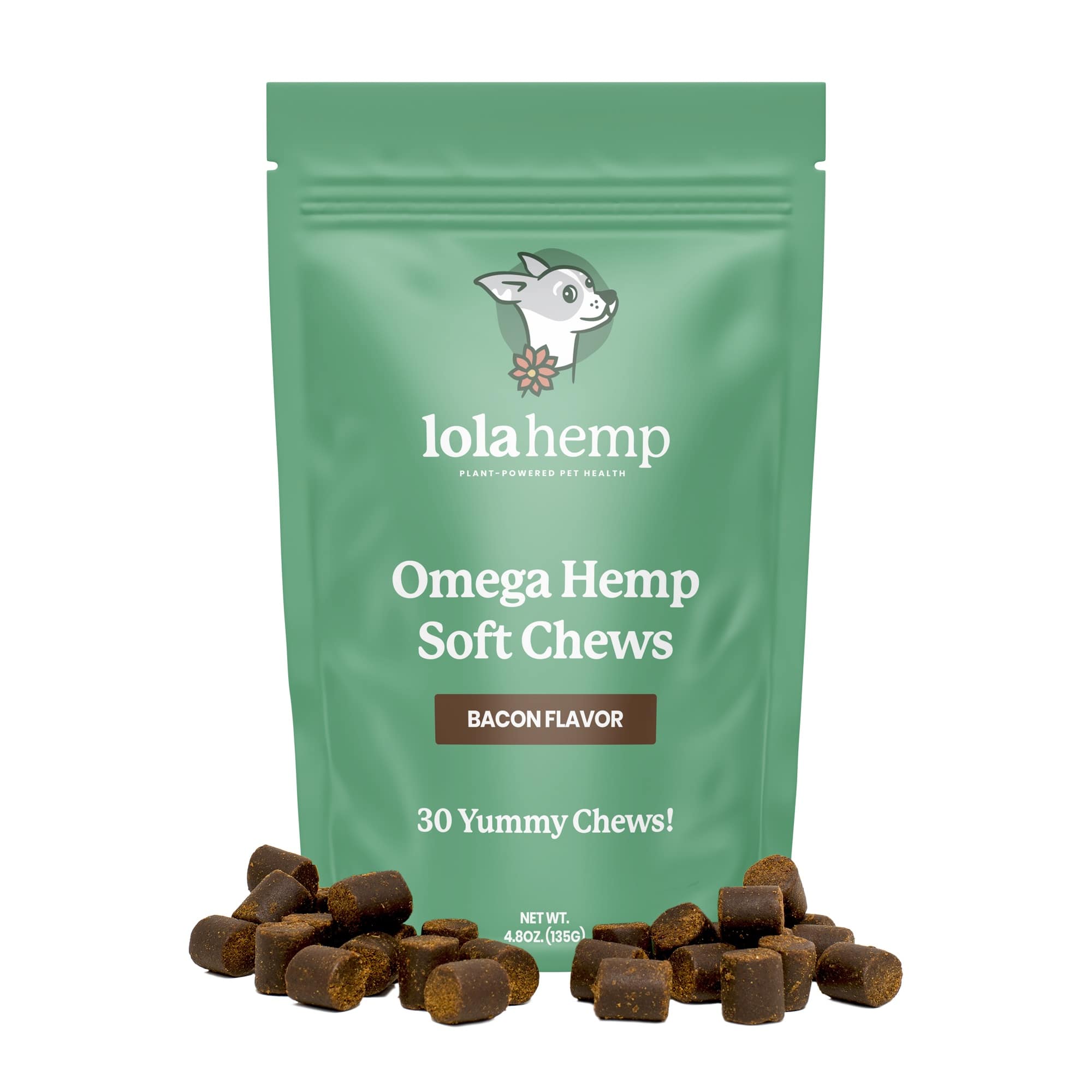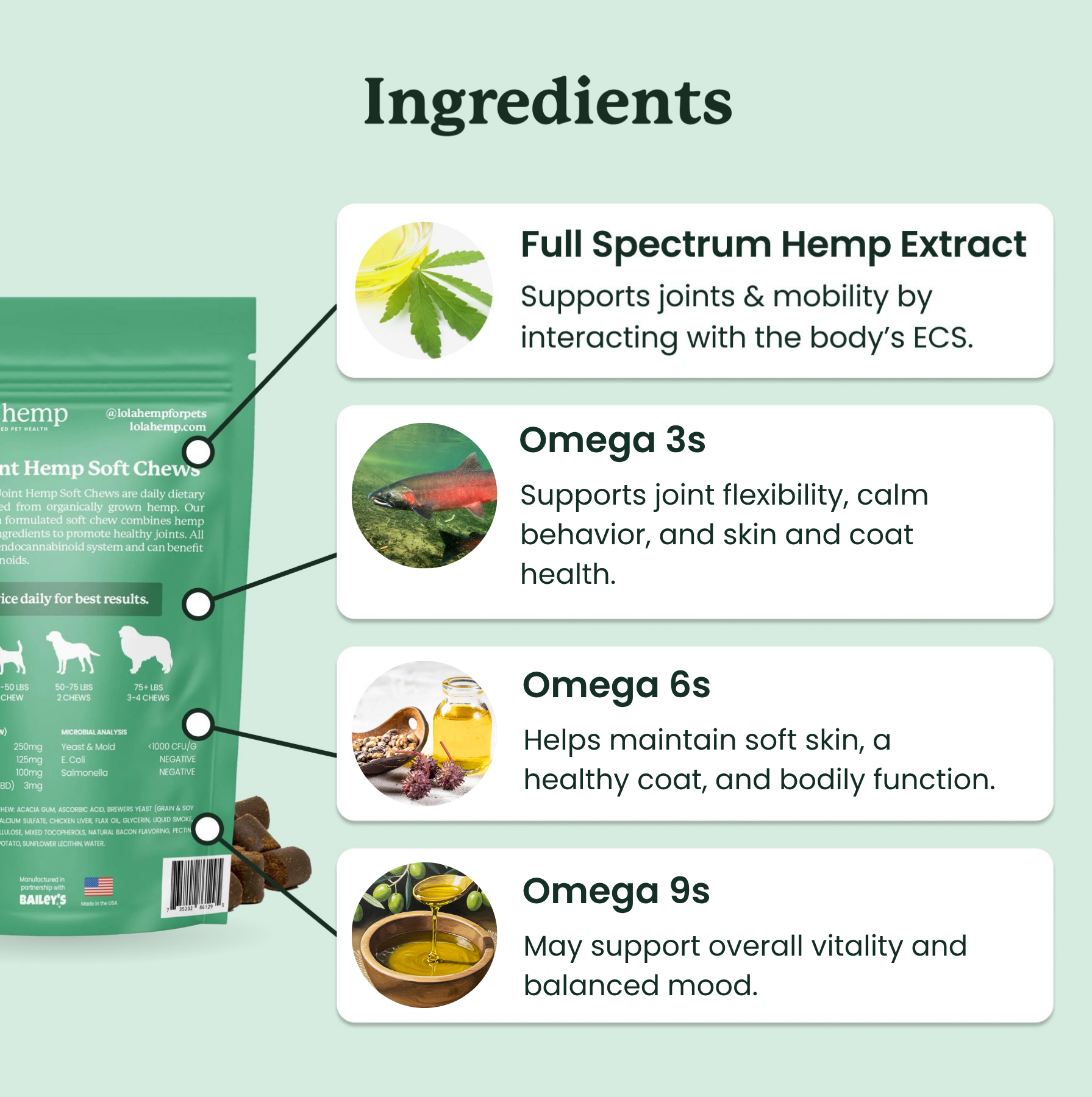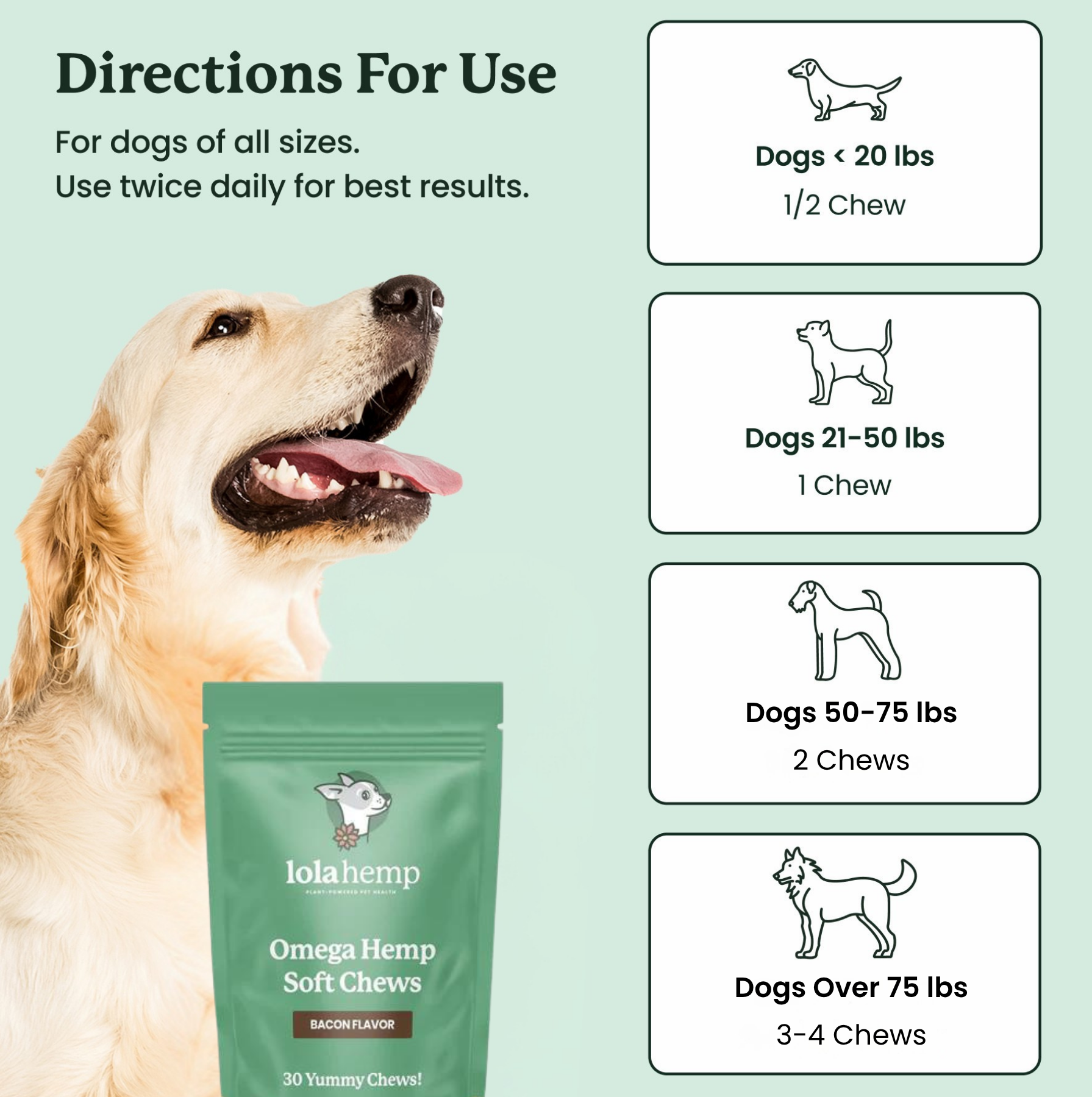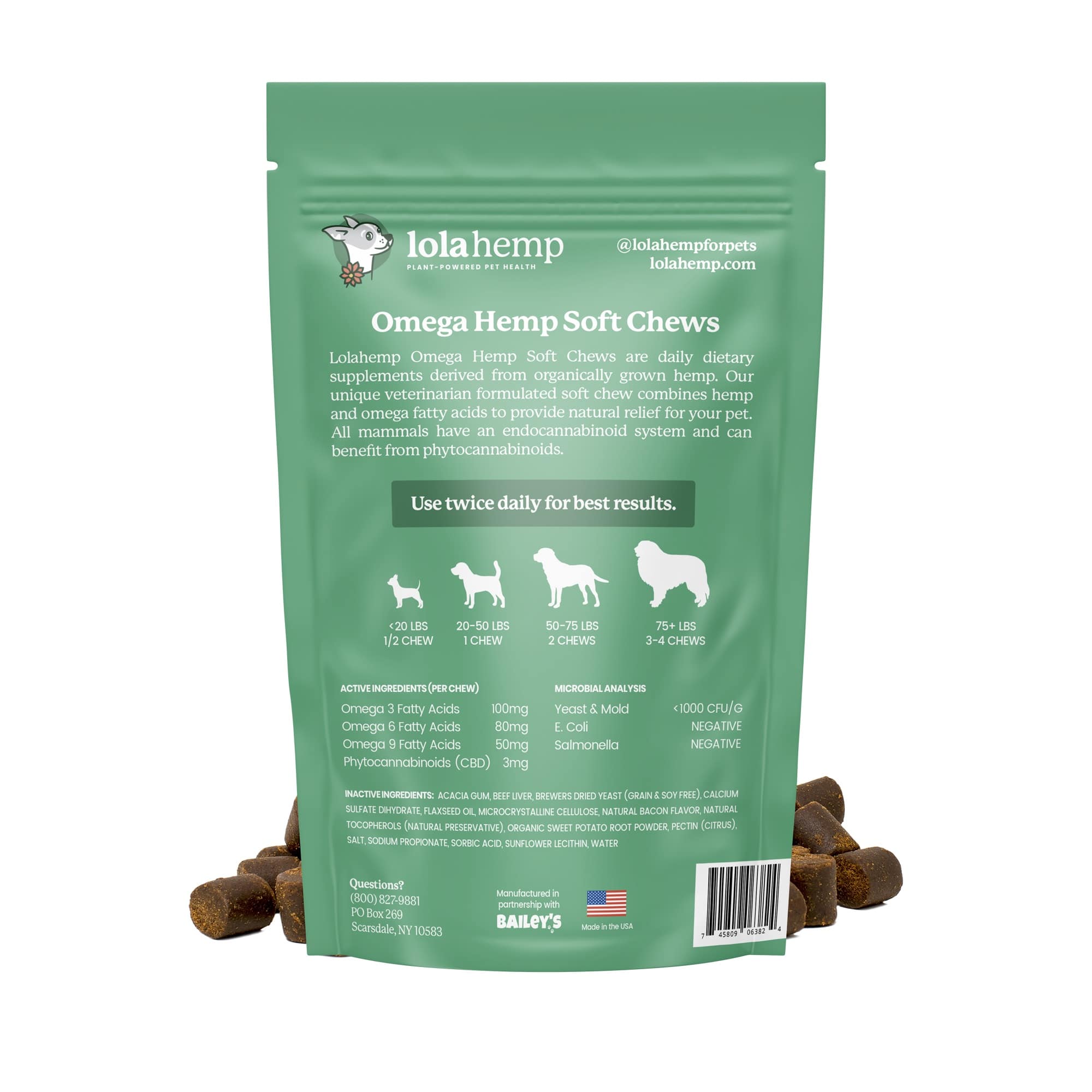Important Information
Consult your veterinarian before giving Omega-3s to your dog to ensure it’s the right choice and to determine the best form (diet, oil, capsules, or whole fish). Lolahemp provides general information but does not offer specific dosing advice. Always follow your vet’s guidance.
If you're here, you're likely looking to provide the best nutrition for your dog. You may have considered options like wild Alaskan salmon oil, hempseed oil, or other natural supplements to support your dog's health.
Many pet owners are curious about the benefits of omega-3 fatty acids for dogs, and fish oil supplements are popular, but do they help?
This guide covers the essentials of omega-3 fatty acids, the role of fish oil in your dog's diet, and more. Prepare to learn how fish oil can be a key omega-3 supplement for your canine companion!

- Why Are Omega 3s Important for Dogs?
- What Are Omega 3s, 6s, and 9s Used For?
- There Are Three Types of Omega-3 Fatty Acids:
- Benefits of Omega-3 Fatty Acids
- Is Fish Oil the Best Source of Omega 3s for Dogs?
- Omegas for Dogs: Dosage Information
- Can I Give My Dog Human Omega-3?
- Conclusion
- Frequently Asked Questions About Omega-3 for Dogs
Why Are Omega 3s Important for Dogs?
Omega-3 fatty acids are essential fats that must come from your dog’s diet. They support skin, coat, joint, heart, and brain health. Omega-3s also help manage inflammation and boost the immune system.
Without enough omega-3s, dogs may experience dry skin, poor coat condition, joint discomfort, cognitive decline, and a weakened immune system. Ensuring adequate intake is crucial for overall health and well-being.
What Are Omega 3s, 6s, and 9s Used For?
Omega-3, 6, and 9 fatty acids are essential for your dog’s health. Omega-3s and omega-6s must be obtained through diet, while omega-9s are produced by the body but still provide benefits.
Omega-3 Fatty Acids
- Skin & Coat Health: Reduces itching and dryness.
- Joint Health: Eases inflammation for joint comfort.
- Heart Health: Supports cardiovascular function.
- Brain Function: Boosts cognitive health.
- Immune System: Strengthens immunity.
- Eye Health: Supports retinal health.
- Weight Management: Promotes metabolic health.
- Digestive Health: Aids gastrointestinal function.
Omega-6 Fatty Acids
- Skin & Coat Health: Maintains healthy skin and coat.
- Joint Health: Supports joint flexibility.
- Heart Health: Contributes to cardiovascular health.
- Brain Function: Maintains cognitive health.
- Immune System: Supports immunity.
- Cell Health: Maintains cell membrane integrity.
- Metabolism: Supports energy levels.
Omega-9 Fatty Acids
- Skin & Coat Health: Supports healthy skin and coat.
- Joint Health: Maintains joint comfort.
- Heart Health: Contributes to cardiovascular health.
- Brain Function: Supports cognitive health.
- Immune System: Strengthens immunity.
- Metabolism: Supports metabolic processes.
There Are Three Types of Omega-3 Fatty Acids:
- Alpha-linolenic acid (ALA)
- Eicosapentaenoic acid (EPA)
- Docosahexaenoic acid (DHA)
EPA and DHA are found in cold-water ocean fish, fish oil, krill oil, and products made from algae. In contrast, ALA comes from plants like flaxseeds and chia seeds.

Benefits of Omega-3 Fatty Acids
Beyond providing energy as a source of calories, omega-3s are a popular supplement for dogs. Many dog owners are interested in omega-3s due to their potential benefits for joint pain, heart health, skin conditions, and more.
Small clinical trials suggest that omega-3s can help manage or reduce inflammation in dogs with joint conditions like osteoarthritis. Similarly, dogs with inflammatory skin conditions like atopic dermatitis may also benefit.
Is Fish Oil the Best Source of Omega 3s for Dogs?
Fish oils can be a great source of omega fatty acids for your dog, but there are a couple of things to keep in mind.
First, there's a range of quality when it comes to fish oil supplements for pets. The source and manufacturing processes vary greatly. Many pet owners opt for wild Alaskan salmon oil for their pets, as it often has higher quality and reputable sourcing practices.
That said, with the help of your veterinarian and a keen eye for well-made products, fish oil might be the best option for your dog. There are also other sources to consider.
Other Sources of Omega Fatty Acids:
- Camelina Oil – DHA source, vegetarian, less contamination risk but pricier.
- Flaxseed Oil – Rich in ALA, plant-based, but less efficiently converted to EPA/DHA.
- Chia Seeds – Good plant omega source, same ALA conversion limitation.
- Hemp Seed Oil – Balanced omega-3/6 ratio but lower EPA/DHA content.
- Hemp Oil – Contains omega-3s, often used for calm and joint support.
Omegas for Dogs: Dosage Information
The appropriate dosage of omega-6 and omega-3 for dogs should be determined with the help of your veterinarian.
Your vet will consider your dog's weight, breed, age, and diet to decide on an appropriate dose. The proper amount of omega-3s differs for each condition. If your dog has gastrointestinal problems or a bleeding disorder, omega-3 supplements may not be safe.
Always follow the dosing instructions on the product label and use pet-formulated products, as human supplements may contain too much DHA and EPA for dogs.
| Dog's Weight (lbs) | Dog's Weight (kg) | Recommended Dosage |
|---|---|---|
| 10 | 4.5 | 1/4 tsp |
| 20 | 9 | 1/2 tsp |
| 30 | 13.5 | 3/4 tsp |
| 40 | 18 | 1 tsp |
| 50 | 22.5 | 1 1/4 tsp |
| 60 | 27 | 1 1/2 tsp |
| 70 | 31.5 | 1 3/4 tsp |
| 80 | 36 | 2 tsp |
Always consult your veterinarian before deciding on a supplement dose for your dog. This table is based on general guidelines only.
Can I Give My Dog Human Omega-3?
It’s best to give your dog supplements formulated specifically for pets. Some ingredients or dosages in human supplements can be unsafe for dogs. Always check with your veterinarian before offering any product made for humans.
Conclusion
Always research supplements for your dog and consult your vet. Whether it's CBD or fish oil, let the experts guide your choices. Omega fatty acids, especially Omega-3s, are crucial for your dog's health, supporting skin, joint, heart, and brain function.
Frequently Asked Questions About Omega-3 for Dogs
1. What do omega-3 fatty acids do for dogs?
Omega-3s support your dog’s skin, coat, joints, heart, and brain health. They can also help maintain a healthy inflammatory response and immune system.
2. Can I give my dog fish oil every day?
Many dogs take daily omega-3 supplements safely, but it’s best to confirm dosage and product choice with your veterinarian first.
3. What type of omega-3 is best for dogs?
EPA and DHA from fish oils or algae are the most beneficial forms. Plant sources like flaxseed oil contain ALA, which dogs convert less efficiently.
4. Can omega-3 help dogs with arthritis?
Omega-3s may help reduce inflammation associated with arthritis and improve comfort. Effects vary depending on the dog and the supplement’s quality.
5. What are signs my dog needs more omega-3s?
Common signs include dry skin, dull coat, excessive shedding, stiffness, or decreased mobility. A vet can confirm if omega supplementation is appropriate.









